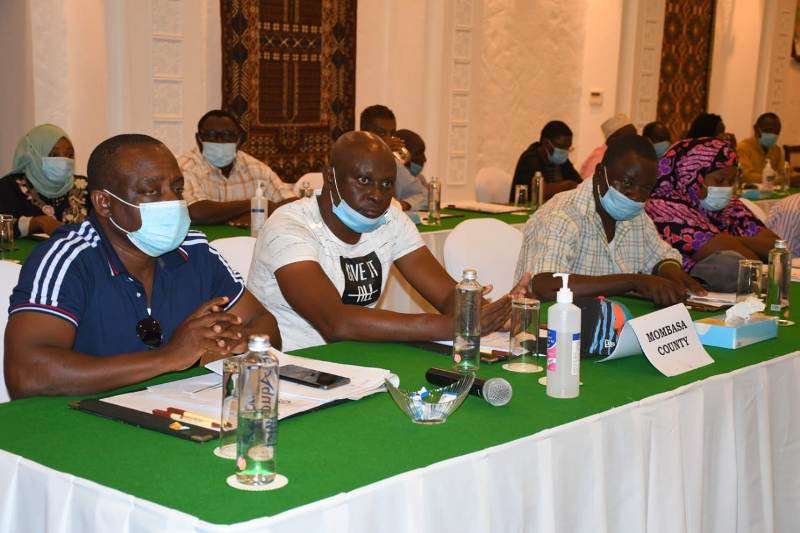Senators upbeat proposed Bill to transform coconut industry

The Chairman of the Senate Standing Committee on Agriculture, Livestock and Fisheries Njeru Ndwiga (M) briefing the media on the proposed Coconut Industry Development Bill 2021 at Serena Beach Hotel in Mombasa on 11 August 2021. Photo | Courtesy
BY COASTNEWSPAPER CORRESPONDENT
Three Coast Senators are upbeat the proposed Coconut Industry Development Bill 2021 will not only improve the coconut industry but also change the livelihoods of farmers in the region.
Senators Mohamed Faki (Mombasa), Issa Boy (Kwale) and Stewart Madzayo (Kilifi) noted with appreciation the Bill would be a game changer in the economic fortunes of the farming areas.
Asking the farmers to boost their productions, the legislators said the majority of them stand to benefit if the Bill is enacted into law.
“That will unlock the economic potential of the region that has been stunted for far too long since Kenya attained its independence,” they added.
The trio spoke during a Public Participation Forum to collect views on the proposed Bill that was organised by the Senate Standing Committee on Agriculture, Livestock and Fisheries at Serena Beach Hotel in Mombasa on August 11, 2021.
FORUM
The forum brought together stakeholders from all the coconut growing counties of Kilifi, Kwale, Mombasa, Lamu, Tana River and parts of Taita Taveta.
“This Bill is very important for the region as coconut trees are the major cash crop for the Coast people but its farming has not received proper support,” said Boy.

A section of the stakeholders who participated in the Public Participation Forum to give views on the proposed Coconut Industry Development Bill 2021 at Serena Beach Hotel in Mombasa on 11 August 2021.
Photo | Courtesy
According to him the push to institute reforms including legalisation of mnazi (palm wine) started way back in late 1990s after being spearheaded by the former minister and Kisauni MP the late Karisa Maitha without any progression.
Madzayo lamented that despite the coconut crop generating about Sh3.2 billion annually from the sale of its products, farmers in the region are still languishing in poverty.
“This Bill will help to address issues that hindered the development of the crop and enable farmers to achieve its full benefits like other countries,” he added.
On his part, Faki said there is need for the national and county governments to support the development of the coconut sub-sector which he said has the potential to generate billions of shillings and benefit the farmers.
The Committee Chairman Njeru Ndwiga said with proper legislation and guidance the coconut industry will realize its full potential.
Ndwiga said the House committee will seek for the necessary financial support from the national government to develop the sector and improve the lives of thousands of farmers.
“The purpose of this forum is to collect the views of the stakeholders so we can formulate laws that will help to enhance production and ensure the crop achieves its commercial value.
Kitui Senator Enock Wambua who is also the vice chair of the committee said there was need for the government to give the same priority and financial support to coconut farming like tea and coffee.
The Bill sponsored by the Senate committee seeks among other things to establish the Coconut Industry Development Board, its composition and functions.
It will also provide for the production, processing, marketing and distribution of Kenya coconut and its products.
Provide a framework for coconut farming, development and ensure value addition to coconut and its related products, and for connected purposes.
According to Micro Enterprises Support Programme Trust (MESPT), Kenya’s coconut sub-sector supports over 100,000 households in the coastal region.
MESPT also shows that the crop contributes an estimated 1.5 percent to the agricultural GDP and 0.4 percent of Kenya’s GDP.
The main challenges faced by coconut farmers are mainly at production level, which include lack of accessibility of quality planting material, menace of pests and diseases and prolonged drought conditions.

